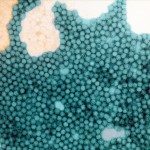Link to Pubmed [PMID] – 22939977
J. Virol. Methods 2012 Dec;186(1-2):104-8
The three attenuated strains Sabin are used as oral vaccine to immunize against poliomyelitis in many countries. Low vaccine coverage can allow these strains to circulate among non-immunized people, accumulating genetic modifications through nucleotide substitutions and recombination with non-polio enteroviruses. These modifications can induce a loss of attenuation, so promoting the emergence of pathogenic vaccine-derived polioviruses responsible for poliomyelitis outbreaks. In vitro-engineered chimeric viruses containing both Sabin and non-polio sequences constitute a powerful tool for understanding the constraints that drive and limit the recombination events between the Sabin strains and other enteroviruses and to understand the consequences on the viral phenotypic properties of substitutions of large genomic regions due to recombination events. A method was optimized that allowed the rapid production of customized Sabin-derived viruses. By using sequences from Sabin 2 and 3 polioviruses and from non-polio field enteroviruses, several recombinant genomes were engineered by using fusion PCR. The corresponding viruses were recovered after cell transfection. This method was found able to generate rapidly a wide range of unnatural viruses with multiple breakpoints that can be chosen precisely. Furthermore, this method is also suitable to engineer nucleotide deletions, insertions and/or substitutions within a given genome, so increasing the number of unnatural viruses that can be studied.
